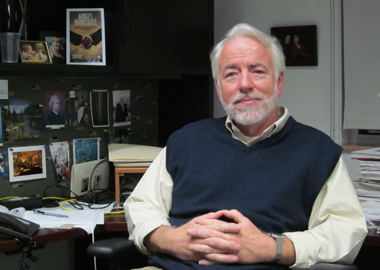The Occupy Movement recently received support from a new organization of professional economists, a number of whom are based in the Pioneer Valley.
“We are economists who oppose ideological cleansing in the economics profession,” the Economists’ Statement In Support Of Occupy Wall Street begins. “Equally we oppose political cleansing in the vital debate over causes and consequences of our current economic crisis.”
The economists behind the statement, including several professors at the University of Massachusetts, have created a new initiative called Econ4, as in economics “4 people, 4 the planet, 4 the future,” as well as a website (www.econ4.org) on which they posted an “Occupy Economics” video just before Thanksgiving. The video has already received more than 75,000 hits.
“There is a revolving door between the market and government,” states Econ4’s James Boyce, a professor of economics at UMass-Amherst, “where power and wealth are closely connected.”
Capitalizing on the momentum created by the Occupy Movement, Econ4 aims to effect change through “popular economics education,” as Boyce’s fellow UMass-Amherst economics professor Nancy Folbre wrote recently in a New York Times blog post.
Popular economics education? The phrase seems oxymoronic. What field is more institutionalized and less popularized than economics?
Yet here is Econ4, a new initiative floating around the outskirts of economic academia, aiming to “end intellectual monoculture in the economics profession,” as its website reads.
Why are they doing this? And just what do they hope to accomplish?
“In the wake of the financial crisis, there was a need and demand for a better understanding of economics, more rooted in reality,” James Boyce tells me as we talk in his office. “You can’t delegate this stuff to the high priests of academia, Wall Street, and the Treasury Department.”
Boyce’s office is in Gordon Hall, a beautiful building that exudes architectural appeal. It would be all too easy for Gordon Hall’s esteemed professors to rest complacently in academic bliss. Those invested in Econ4, however, say they intend to bring about change in the oftentimes otherworldly economic world from the ground up.
“We can’t just write on our computers,” Boyce says. “We need a strategy for communicating ideas. We aim to do an end run around the corporate-controlled media and its talking heads by using new information technologies.”
By contributing Internet-friendly teaching materials and creating a collaborative space for an online community of dissident economists—their Network for Innovative Economics Teaching—Econ4 hopes to change the study and implementation of economics.
“Part of the problem is economics itself, in the research being done and the economics being taught,” Boyce continues. “We want to change the public understanding of how the economy works, and, more importantly, how it should work.”
For Econ4, that means breaking through the walls of market fundamentalism and its stranglehold on the discussion, or lack thereof, of economics.
Still in its organizational infancy, Econ4 has teamed up with Softbox Digital, a digital start up out of Portland, Ore., to create a series of videos that can be used and disseminated through the Internet. With the eventual funding Econ4 hopes to procure from foundations and (mostly, Boyce tells me) individuals, they plan to create up to 30 such videos.
So far there are two teaching videos, both about three minutes in length: “An Introduction to Econ4,” and another titled “The Challenge.” But Boyce and his colleagues are confident that funding will be there based on the online interest Econ4 has already received, and the opportunity to effect change brought on by the Occupy Movement.
“The Occupy Movement has already led to a seismic shift in the debate about economics by framing the central issues as growing inequality of wealth and power,” Boyce states. “You can already see the discourse changing. People are talking about distribution of wealth and power in a way they haven’t in a generation.”
And by creating virtual communities such as The Network for Innovative Economics Teaching, as well as digital videos, Econ4 hopes the national discourse around economics will continue to be popularly discussed.
“We can only have a highly functioning economy if there is a highly functioning democracy,” Boyce insists. “The only solution is more democracy—a more democratic distribution of power and a more democratic distribution of wealth”—a solution with which the Occupy Movement would certainly agree.



